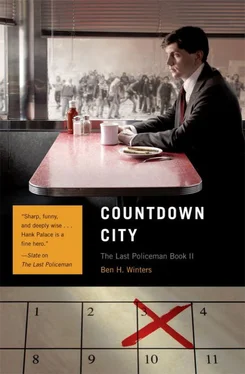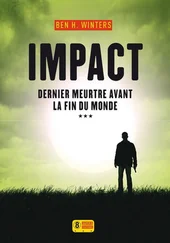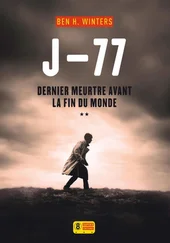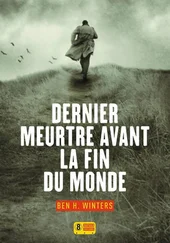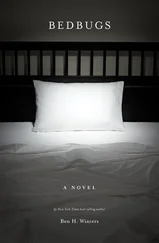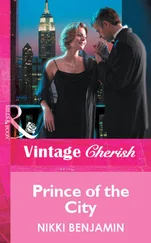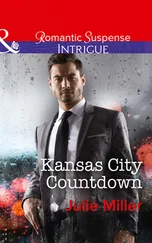“Stay,” I say to Rocky. “But let Martha go.”
He shakes his head, starts to speak, but Martha interrupts him, suddenly composed, calm, clear as daylight. “Go?” she says. “Go where ?”
That I cannot answer. The woman is waiting in a burning parking lot for an imaginary line of cars, and I have no better option for her. McConnell’s country cop shop is not mine to offer. My own house was stripped from boards to beams. The world is running out of safe places.
“Thank you, Henry,” says Martha Milano, and leans forward and kisses me gently, leaving the barest trace of lip gloss on my cheek. I raise one hand to touch the spot with two fingers. She’s gone already, clutching her father’s solid arm as he leads her back inside to wait for doomsday.
“I’m so sorry, McConnell,” I say, as I dive back into the Impala. “Let’s go.”

We all hear it at the same time. It’s the middle of the night and the house comes to life, cops rolling out of bed or leaping off mattresses, jamming guns into the waistbands of sweatpants; cops sticking their heads into the bedrooms crowded with kids, whispering “stay where you are, guys” and “everything’s fine”; cops streaming outside to back up Officers Melwyn and Kelly, who are on porch duty tonight and are therefore the commanding officers on the scene, per our agreed-upon rules of engagement.
“Three sharp crashes,” barks Officer Melwyn, holding his Beretta up against his chest, addressing the group. “On the property or just over the line.”
“We need a team for the south lawn,” says Officer Kelly, everybody nodding, weapons drawn. I’m carrying a SIG Sauer now, the same handgun I used to carry on patrol. We’re breaking into clusters, getting ready to move, when we all hear the noise again: a loud crashing, like metal on metal, and everybody freezes.
“It’s a bear,” says Officer McConnell.
“What?” whispers Melwyn.
“Look. Bear.”
We all look, the group of us, a crowd of cops on a porch in the western woods of Massachusetts at two, maybe three o’clock in the morning, flooded with adrenaline and staring at the massive lumbering figure of a brown bear pawing at the door of the shed. It’s one of our several outbuildings, and it houses blocks of ice, barrels of raw sugar and salt and dried oats, boxes full of iodine tablets and bleach, stores of ammunition and a few pounds of explosives. For a second we are all paralyzed, awed by the burly majesty of the bear. It gives up on the padlocked shed and lopes across the lawn, making its shaggy way back toward the surrounding brush.
“Beautiful,” whispers McConnell.
“Yeah,” I say.
“We should shoot it,” says Capshaw.
No one objects. Officer Capshaw steps down off the porch, a big man with a moon of a head and a buzzed scalp. He aims a rifle in the moonlight and brings down the bear with two quick shots, pop, pop .
Volunteers are asked for to skin and dress the bear, and the rest of us go back to bed.
* * *
What the children decided, after much debate and discussion, was that the big converted-barn country house in Furman, almost at the New York state line, should just be called Police House. Some of the younger kids spent a whole afternoon in secret, in the area of the barn designed for arts and crafts, painting an elaborate sign for Police House, with golden badges, arcing rainbows, peace signs, and sparkling silver stars. Among the adults there was intense debate, much to the children’s consternation, about the wisdom of hanging such a colorful display above the eaves of what is, after all, a hideout. I was among the most skeptical. Trish, however, took the kids’ side: “It’s not like we’re inconspicuous anyway, right?”
We are nineteen adults and thirteen kids altogether: all policemen and policewomen and police spouses and the children of police, plus three members of the support staff, including Rod Duncan, the saturnine but beloved ex-con who served as the CPD janitor for twenty-nine years. The children range in age from four to fifteen. Houdini is not the only pet: there are two cats, one rabbit, and a goldfish bowl that was transported effortfully by Officer Rogers’ nine-year-old twins, balanced on laps for two hundred forty miles at ninety miles an hour. There is also a massive sheepdog named Alexander, the property of a patrolwoman named Rhonda Carstairs. Alexander is a shambling old creature with watery eyes and a befuddled expression who, despite being ten times Houdini’s size, follows my dog around like an aide-de-camp.
Despite the size of the house and its attendant outbuildings, sleeping space is limited, and at some point Officer McConnell and I made the mutual decision, with very little discussion, to share a bedroom. I asked her if she felt it was important to have a conversation with Kelli and Robbie about this, maybe offer some delicate explanation of the change, but Officer McConnell said no.
“They like you,” she says. “They’re happy.”
“Are you happy?” I say.
“Well, shit.” She leans against my torso. “As happy as it’s gonna get. How’s the arm?”
“I can feel it. When I poke it, it hurts.”
“So stop poking it.”
This was a Saturday morning, last Saturday—we were standing on the porch watching Kelli and two of the other kids on an improvised parade, with Houdini yipping along beside them like he was Secret Service protection, Alexander shambling behind.
* * *
Officer Capshaw and I are the guards on duty, and he is in the woods just past the property line, urinating against a tree, when a slow-moving vehicle appears in the distance, a dim bobbling light a hundred yards or so down the one narrow lane that approaches the house.
I stand up. Houdini stands up, too, tail at a sharp angle, snout pointed out toward the road, toward the strange noise we’re hearing now: the unmistakable clip-clop of hooves along the roadway.
Houdini barks. “I know,” I say. “I know.”
It’s a horse and carriage, appearing out of the darkness as if from the pages of a fairy tale, rattling along the graveled county road toward the house. Perched on the seat is Cortez, grinning, in a top hat, holding the reins of a speckled mare with comical gentility.
“Oh, hello,” he says, reins in the horse and tips his hat. He’s wearing his hair in a loose ponytail, like Thomas Jefferson.
I keep the gun raised. “How did you find me here?”
“You don’t want to know how I got the carriage and the horse?”
“I want to know how you found me.”
“Fine.” Cortez climbs out of his gig and tosses the top hat onto the porch, as if he’s been living here all along and is very happy to be home. “But the horse story is better.”
“Keep your hands where I can see them, please.”
He sighs and obeys, and I ask him again for the story. Turns out there’s a young officer named Martin Porter who was part of the original Furman-house plan but dropped out when he met a girl in Concord who wanted to go to Atlantic City because she’d heard about a countdown party getting going down there. Cortez knew Porter because Porter had a bunch of crystal meth he’d gotten from the evidence room before it was sealed, and Cortez had been selling it for him, fifty-fifty split, to some beach junkies on the Seacoast.
“Anyway, last week Ellen and I had a bit of a disagreement.” Cortez waggles his left hand, and I see in the dim light of our outside torches that the tip of his pointer finger has been shot off. “And she got custody of our Office Depot. Porter tells me about this crazy hideaway in the woods, for policemen only! And I thought to myself: Hey, I know a policeman.”
Читать дальше
